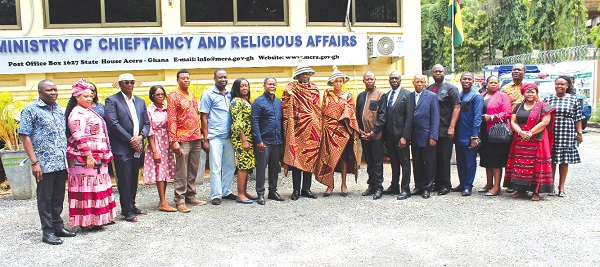|
Getting your Trinity Audio player ready...
|
A delegation of traditional leaders from the Free State Province of South Africa has paid a working visit to the Minister of Chieftaincy and Religious Affairs, Stephen Asamoah Boateng.
The meeting, on the insistence of the South African leaders, is part of activities of the delegation’s visit to Ghana to enable them consult with traditional rulers in the Eastern and Ashanti regions.
The delegation was led by the Deputy Director-General of Traditional Affairs, Department of Cooperative Governance and Traditional Affairs, Free State Province, Annah Buthelezi.
It comprised four principal and senior traditional leaders from the Bakoena Ba Mopeli Principal traditional community; Batlokoa Ba Mota Principal traditional community; Makholokoe Senior traditional community and Batlokoa Ba Mokgalong Senior Traditional community all in the Free State Province.
The respective traditional rulers on the delegation included Morena Moremoholo Mopeli, Morena Montoeli Dugaard Mota, Morena Paulos Moloi and Kgosi Nkgahle Tsotetsi.
Accompanying them was the South African High Commissioner to Ghana, Grace Jeanet Mason.
Mr Boateng also stressed the need for a closer collaboration between Ghana and South Africa to help protect, strengthen and modernise the chieftaincy institution in both countries.
He explained that already, his outfit was pushing for the amendment of the Chieftaincy Act, 2008 (Act 759) to, among other things, transfer more power to traditional authorities to be able to summon to their respective palaces, people who misconducted themselves or flouted local bye-laws.
That, he explained, was to help complement government’s role to be able to govern the country more effectively at the local level which would ultimately impact positively on good governance in the entire nation.
Additionally, Mr Boateng said the ministry was advocating the documentation or codification of lines of succession to stools and skins, as well as automation and digitisation of the judicial processes.
This initiative, the minister explained, would ultimately help to reduce the chieftaincy cases in the nation and flush out ineligible people who were not royals to be enstooled.
Chieftaincy Fund
The minister also hinted that he was initiating a move to set up a Chieftaincy Fund that would help maintain the chieftaincy institution and address the funding gap to enable the institution carry out its mandate effectively.
The fund when set up would be managed by the National House of Chiefs to empower them financially and insulate them from being influenced by politicians.
“Traditional leaders without money, basically your power is gone down; so find a route, I have found a route calling it the Chieftaincy Fund,” Mr Asamoah Boateng stressed.
He further hinted that the sources of the funds would come from royalties, while chiefs would be empowered to set up the structure to manage the funds, including its disbursement.
Similarities
Morena Mopeli, speaking on behalf of the South African leaders, said the system of selecting chiefs in Ghana was similar to that of the Free State Province and for that matter, South Africa.
He supported the idea for more collaboration between the two countries on how best to share power between traditional authorities and politicians to ensure chiefs did not remain only ceremonial leaders.
The traditional ruler was also not happy about the way civil society groups in South Africa recently took the government to court to prevent measures by the South African government to give more power to chiefs in the country.
The South African High Commissioner, Ms Mason, said the Free State Province was the bread basket of South Africa and shared many similarities with the Ashanti and Eastern regions.
“Free State Province has very rich cultural heritage which are inextricably linked to that of Ghana hence the visit is important,” she stated.
The Deputy Director General of Traditional Affairs, Department of Cooperative Governance and Traditional Affairs, also indicated that the province had a rich political history, including the establishment of the African National Congress in 1912 and the National Party in 1914.
Source: myghanadaily


